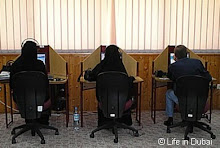There's a hint in a report in 'Gulf News' that Dubai's property market may be edging towards some sanity.
Better Homes and Landmark, two major real estate agents, are talking about some price increases over the past two months.
Ignoring the price rise claims, because they're average prices in a one month period, the encouraging part is that they talk about property in specific locations rather than generalising about the whole of Dubai.
And at long last we're hearing terms which are normal in sensible property markets. Phrases such as: "Developments in certain locations, with high build quality and facilities are experiencing price increases." "Prices are increasing, dependent on the location of the property and the quality of the building." "Location, views, amenities and infrastructure determine prices."
Those things have largely been ignored in Dubai's property market in the past.
It's long overdue after the absolute chaos of the free-for-all since freehold property for foreigners was announced in early 2002.
Until very recently there were no laws in place, nothing governing real estate agents or brokers, no escrow accounts, no protection for buyers and often no contracts were issued until after the money had been paid.
Although an awful lot of people have lost money, especially since the world-wide economic crisis hit, I'm amazed the numbers are as low as they are.
Developers, completely unknown to investors, sold off-the-plan apartments and villas before any work whatsoever had begun. Many buyers, more than a few never having visited Dubai, bought on faith alone, and perhaps greed, from plans and an artist's impression of the finished building and neighbourhood. It wasn't unusual for the plans, specs and renderings to be somewhat economical with the truth.
Many developers had no capital but relied on payments from investors to fund the projects. It would have been easy for the developers to pocket the money and run, but surprisingly few did.
Prices bore little relationship to reality. Master developers initially sold at way below what the market was prepared to pay. That encouraged speculators to leap in and on-sell almost immediately at a huge profit. It wasn't unusual for speculators to have no finance, they simply on-sold before the payment was due.
Stories appeared about the huge profits to be made and the market took on a life of its own with speculators and investors pouring in and pushing prices to ludicrous and unsustainable levels.
The end result, a finished building, didn't matter, didn't come into the picture. What was being bought and sold wasn't a building but simply a way to make a quick buck, and that worked for a while.
But each trade was nearer to the end product and that's where the rules of buying real estate began to loom.
In the feeding frenzy the rules governing real estate buying were ignored. Location, quality, price weren't considered. People who bought at the peak and the year or two leading up to it now have negative equity. Many will lose their property and their money, just as they do all over the world.
Many more are going to lose their money because since the economic crisis hit developers are being found out. If they didn't have finance for the project, or if they diverted income to other projects, the project is in trouble and may never be finished - or started in some cases.
When the dust settles there'll be the early speculators gleefully counting their huge profits but plenty of others counting their losses.
In future there'll be fewer developers, fewer developments, more care taken in design and build quality, more realistic prices. We should also see the rules of property buying being applied and maybe, just maybe, this report indicates that's started to happen.
You can read the report here.
Saturday, June 27, 2009
Subscribe to:
Post Comments (Atom)






No comments:
Post a Comment